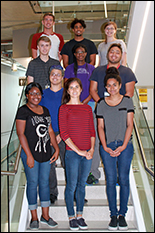Fischell Department of Bioengineering Launches REU Program
This summer, the University of Maryland (UMD) Fischell Department of Bioengineering (BIOE), with support from the National Science Foundation (NSF), kicked off a new initiative to introduce undergraduates from institutions across the country to new approaches to engineering cells, tissues, and organs. BIOE’s summer NSF Research Experience for Undergraduates (REU) enlists undergraduates to investigate new engineering technologies for constructing and mimicking tissues and organs. In its inaugural year, the 10-week BIOE REU team welcomed 10 students from bioengineering, mechanical engineering, pre-med, and materials science and engineering programs across the country. This year’s students supported projects in cancer cell microenvironment and migration on a chip, 3D printing and microsystems for extracellular vesicle biomanufacturing, and 3D-printed scaffolds for improved tissue regeneration. Each research project is conducted as a collaboration between UMD and the U.S. Food and Drug Administration, making the BIOE REU unlike any other available in the country. At the end of the BIOE REU program, students take part in the FDA’s annual research fair, where they present their work to other undergraduate researchers as well as FDA technical staff, non-FDA scientists, and even the FDA Commissioner. “REU programs in general offer a great opportunity for students to go to a completely different university, where the facilities are different, the things you’re learning are new, and the types of researchers you’re working with offer new perspectives,” said Ekta Patel, a rising senior studying biomedical engineering on a pre-medicine track at Arizona State University. Patel spent this summer working in the UMD Tissue Engineering and Biomaterials Laboratory, for which BIOE Professor and Chair John Fisher is principal investigator. “I previously conducted a lot of research dealing with sensory systems and circuitry, so I had never worked in a wet lab before,” she said. “Getting to the University of Maryland and being able to work in tissue engineering was so different. The REU program is very nicely designed and it offers an opportunity to immerse yourself in something that you might not have otherwise explored.” Similar to Patel, Alejandro Aponte Lugo, a mechanical engineering student at the University of Puerto Rico, Mayagüez, seized the opportunity to experience life in the wet lab. In BIOE Assistant Professor Steven Jay’s Biotherapeutic Development and Delivery Laboratory, Lugo learned what it’s like to work with cells – an experience that he said was eye-opening for him, an engineering student most accustomed to focusing on instrumentation design and development. “One of the biggest surprises for me was learning what it’s like to have cells dictate my work in the lab,” he said. “In mechanical engineering, I’m used to being able to work on my own time and, here, I have to follow the cells as they progress. And, if something goes wrong, then I might find myself back at the starting point. “There’s also an element of uncertainty involved in working with biomaterials,” he said. “In mechanical engineering, there’s a lot of, ‘Let’s change this, and let’s change that. Did that work? Great.’ But, in working with cells, everything is different. You work at a different pace, you apply different tactics. Even the math I did was different; it’s a switch from forces and mechanical stresses to concentrations and analytics. It’s been very cool to get this whole new perspective as a researcher in the lab.” BIOE REU participants receive a $5,000 stipend for their participation in the program, as well as full room and board on or near the University of Maryland, College Park campus. For more information about the BIOE REU program – including details on how to apply for 2019 – please visit http://go.umd.edu/bioereu.
Related Articles: August 24, 2018 Prev Next |


